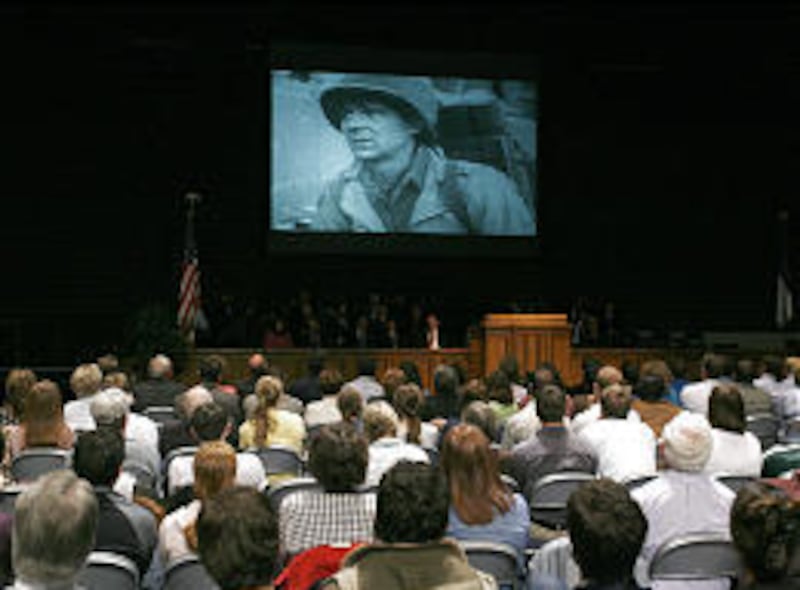PROVO — The standing ovation given Tuesday by Brigham Young University students to Ken Burns was rare by itself.
Rarer still was the timing.
The weekly campus devotionals don't include applause because of the religious setting, and the academic subjects of forum speakers such as Burns generally draw polite applause, but forums and devotionals are scheduled to start at 11:05 a.m. in the Marriott Center and end before 11:50, and BYU students enforce the deadline with their feet, getting up to leave for their noon classes.
On Tuesday, they stayed firmly rooted in their seats through 11:55 and noon and 12:05 to listen to a man some have called "America's storyteller" and to watch the opening scenes of Burns' new documentary about World War II, "The War," which will debut on PBS in September.
And then they stood, late as it was, to thank him.
"It was a great opportunity to hear him speak, but it also was a chance to give him praise," said Chris Graham, a journalism major pursuing a film minor and one of an estimated 4,125 to attend the lecture, according to BYU.
"Producers and directors aren't always able to hear our appreciation because we see their work in movie theaters or on television, so I was grateful to come and clap for him."
Burns referred to the Iraq war several times and said that remembering the history of wars has sometimes helped Americans from rushing into new ones.
Surveys showed the collective American appetite for war in Iraq and Kuwait in 1990 was cut by nearly a quarter after PBS aired Burns' documentary "The Civil War" because, he said, "our film, frame after frame, revealed the real cost of war."
"That war and (Abraham Lincoln) have something to say to us about the arithmetic of war," Burns said. "The arithmetic Lincoln spoke of was the number of dead soldiers that generals would have to send home."
The grisly sum in World War II was 50 million to 60 million dead worldwide, "men, women and children obliterated," Burns said.
He earlier told the Deseret Morning News "The War" doesn't have a political bone in its body, and he added Tuesday that he didn't set out to produce "The War" because of Iraq.
Instead, two statistics assaulted his strong reluctance to make another war film.
The first was that 1,000 World War II veterans die each day. The second came from a mid-1990s study by the National Council for History Education, which found that American high school students have an appalling lack of knowledge about the nation's history despite movies such as "Saving Private Ryan," cable TV series such as "Band of Brothers" and books such as Tom Brokaw's "The Greatest Generation."
"Brokaw should be given a medal for releasing this incredible energy," Burns said of the soldiers who after 60 years have begun to tell their stories.
And still young Americans don't know basic facts. Many believe the United States fought with the Germans against the Russians in World War II.
"We could not ignore (the study's) stupefying truth or the consequences it infers for our still-developing republic," Burns said. "It means despite all the books, the TV dramas, the cable series and feature films, we're still failing to convey essential facts about the biggest and most consequential struggle in the history of our world.
"You could stop a screening of 'Saving Private Ryan' after the Americans storm Omaha Beach and ask the audience, 'Where are we? Why are we here? What is the strategy on this day? Who are our allies? What was the Axis?' I'm sad to say the majority in that theater would stare in silence at us with blank faces."
Historical amnesia will catch up with America, Burns said: "Without a past, we have no sense of the ties that brought us to this glittering, distracted present."
So distracted, in fact, that "we are in a war right now with no direct contact with the combat," he said during a question-and-answer session.
Our American past includes "the madness of global war," a war that without American power would have ended differently, and which led to American domination.
That happened, Burns said, because Americans were united.
"There were no red states and blue states then," he said, "or a disconnect to what was happening to our men ... our men ... in a war overseas."
As Burns and his colleagues worked for six years producing "The War" they discovered the second World War impacted every American home, and a theme emerged that Burns said is as old as history itself — "In extraordinary times, there are no ordinary people."
"The War," he promised, would make that clear as it mines what Burns called emotional archaeology.
"I'm drawn," he said, "to those moments that suggest an abiding faith in the human spirit."
E-mail: twalch@desnews.com




